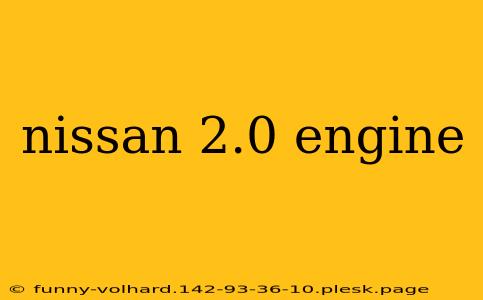The Nissan 2.0 engine isn't a single entity; it's a family of engines spanning decades, each with its own strengths, weaknesses, and quirks. Understanding the nuances of these powerplants is crucial for prospective buyers, current owners, and even seasoned mechanics. This guide dives deep into the world of Nissan's 2.0-liter engines, exploring their history, common variations, performance characteristics, and potential issues.
A Brief History of Nissan's 2.0-Liter Engines
Nissan's commitment to producing reliable and efficient 2.0-liter engines has resulted in a diverse range of designs over the years. Early iterations focused on simplicity and durability, while later models incorporated advanced technologies like variable valve timing (VVT) and direct injection to improve power and fuel economy. Some notable examples include:
-
Early Generation Naturally Aspirated Engines: These engines, often found in older Nissan models, prioritized longevity and ease of maintenance. They typically offered decent power but lacked the high-performance characteristics of later designs.
-
The Rise of VVT: The introduction of variable valve timing marked a significant advancement, allowing for optimized engine performance across the rev range. This technology improved both power output and fuel efficiency.
-
Modern 2.0-Liter Engines: Contemporary Nissan 2.0-liter engines often incorporate advanced technologies like direct injection, turbocharging, and sophisticated engine management systems. These advancements deliver impressive power and torque figures while maintaining relatively good fuel economy.
Common Variations and Their Applications
Pinpointing a specific Nissan 2.0-liter engine requires more information. The engine code, found on an engine identification plate, is crucial for precise identification. However, we can highlight some common applications:
-
QR20DE: This naturally aspirated engine was widely used in various Nissan models, offering a balance of power and fuel efficiency. Its reliability and relatively simple design made it a popular choice.
-
MR20DE: Another naturally aspirated engine, the MR20DE, often featured in more modern Nissan vehicles. It often incorporated VVT for improved performance.
-
Turbocharged Variants: Several turbocharged variations of Nissan's 2.0-liter engines exist, offering significantly more power and torque for performance-oriented vehicles. These often have different engine codes depending on specific tuning and modifications.
Note: This is not an exhaustive list, and many variations exist within these engine families. Always refer to your vehicle's documentation for the precise engine specifications.
Performance Characteristics and Fuel Economy
The performance characteristics of a Nissan 2.0-liter engine vary significantly depending on the specific model and year. Naturally aspirated engines generally offer smooth power delivery and respectable fuel economy, while turbocharged versions provide considerably more power but may consume more fuel.
Factors influencing performance and fuel economy include:
- Engine Design: Naturally aspirated vs. turbocharged, presence of VVT, direct injection.
- Vehicle Weight: Heavier vehicles will generally experience lower fuel economy.
- Driving Style: Aggressive driving significantly impacts fuel consumption.
- Maintenance: Proper maintenance is crucial for optimizing both performance and fuel economy.
Potential Problems and Maintenance
Like any engine, Nissan 2.0-liter engines are not immune to potential problems. Common issues can include:
- Timing Chain Issues: Some engines have reported timing chain issues, potentially resulting in costly repairs.
- Oil Consumption: Some owners have noted higher-than-expected oil consumption in certain engine variants.
- Sensor Failures: Like any complex system, sensor failures can occur, potentially affecting performance and fuel economy.
Regular maintenance, including timely oil changes and adherence to the manufacturer's recommended service schedule, is crucial for preventing potential problems and extending engine lifespan.
Conclusion: Understanding Your Nissan 2.0 Engine
The Nissan 2.0 engine encompasses a broad spectrum of powerplants, each with unique characteristics. By understanding the specific variant in your vehicle and its potential issues, you can ensure optimal performance, longevity, and fuel efficiency. Always consult your owner's manual and a qualified mechanic for specific advice related to your vehicle.

